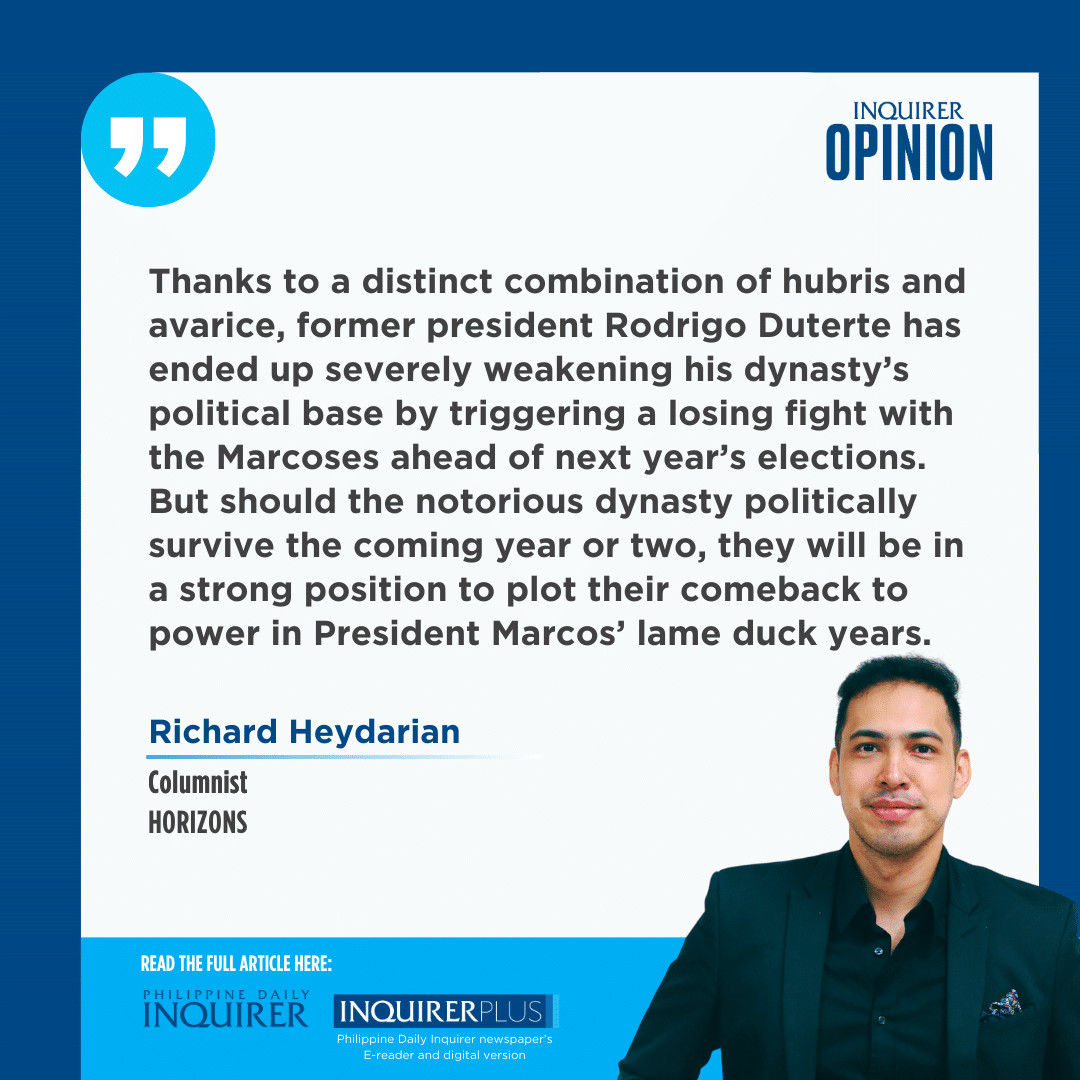After Trump: A Duterte comeback in 2028?
As expected, the nail-biter United States elections created an unexpected outcome. In terms of popular vote, Republican nominee Donald Trump won just over 50 percent of the votes, while his Democratic opponent, Vice President Kamala Harris, won 48 percent. But American elections are not decided by total vote tally, but instead the number of electoral college votes–a relic of the Founding Fathers’ aristocratic predilection. Since almost all states adopt a winner-takes-all approach, a few thousand votes can make all the difference in the world.
Nevertheless, Trump’s stunning political comeback can’t be overstated. He is not only the first Republican candidate to win the popular vote in two decades, he also swept all seven battleground states after making huge inroads among minority groups, most especially Latino and African American male voters. And yes, it seems that Filipino Americans, including some of my relatives, played a key role in swing states, such as Nevada.
And not to mention, the likely Republican Trifecta following the ”Red Wave” across congressional and Senate races. Against the backdrop of a conservative Supreme Court, including three Trump appointees, what we may be facing is a ”Make America Great Again (MAGA) Quad” with immense repercussions for America’s political system and relationship with the world.
So, the question, dear reader, is this: What went wrong for the Democrats? And what are the lessons for other besieged democracies like the Philippines?
To be fair, one could make the argument that the 11th hour reshuffle in the Democratic lineup was self-defeating. The Trump campaign team had sufficient time to adjust to Kamala Harris’ late entry to the race, but she also lacked sufficient time to carve her own unique identity. And had Joseph Biden given way earlier this year or even last year, the Democratic Party would have been in a better position to run a proper primary to elect its most competitive candidate.
In an era of ”anti-incumbency” elections amid cost-of-living crises across the West, Harris’ refusal to break with Biden on contentious issues such as the economy, immigration, and the Gaza conflict sealed the deal. And clearly, her prosecutor background may have alienated certain demographic constituencies, most especially African-American male voters. But one could also make the argument that had former president Barack Obama supported Biden back in the 2016 elections, a Trump scenario could have been prevented altogether. After all, Biden won more than 81 million votes in 2020, with a strong performance among white working-class voters in swing states. One could imagine how a more vigorous Biden—a ”white man” with a folksy touch—could have performed back in 2016.
The reality, however, is that something even more fundamental is at play here. In the words of renowned political scientist Francis Fukuyama, this year’s elections represented nothing less than a ”decisive” rejection by American voters of liberalism and the particular way that the understanding of a “free society” has evolved since the 1980s. The MAGA victory this year has exposed the inherent weakness of contemporary liberalism: both neo-liberalism free market economics–and identity-based liberalism—”woke” culture—have alienated sufficient number of voters to enable Trump’s stunning political comeback.
Across democracies, from Argentina to Germany, ”anti-system” candidates have made tremendous inroads. From Silvio Berlusconi in Italy to the Thaksins in Thailand, populists have repeatedly pulled off political comebacks against all odds by aptly exploiting the weaknesses of liberal-centrist rivals. In the Philippines, the Dutertes have been the ultimate manifestation of the enduring appeal of right-wing populism based on the toxic cocktail of fear, grievance, and theatrics.
Thanks to a distinct combination of hubris and avarice, former president Rodrigo Duterte has ended up severely weakening his dynasty’s political base by triggering a losing fight with the Marcoses ahead of next year’s elections. But should the notorious dynasty politically survive the coming year or two, they will be in a strong position to plot their comeback to power in President Marcos’ lame duck years. Liberal-centrist forces in this country will have to step up their game, abandon vacuous and supine sloganeering, avoid anodyne ”pa-cute” candidates, and establish a robust counter-populist coalition with progressives lest they join the ash heap of history. As for Mr. Marcos, he will have to pin down his bête noire for good—or face the music of demagogic vengeance one he steps down from office.
————–
rheydarian@inquirer.com.ph

















